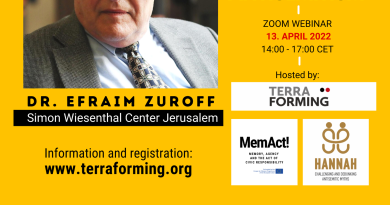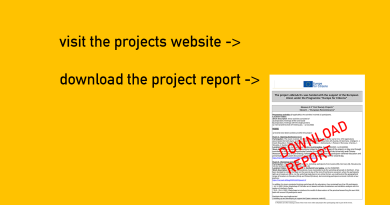MemAct! Concluding Conference
-> REGISTER TO THE CONFERENCE HERE! <-
Holocaust Education:
New Challenges in a Polarising World
MemAct! Concluding Conference / April 25-26, 2022 / Online
In politically tumultuous times, Holocaust memory is under attack. Nationalist movements and a resurgent far right avoid an accounting with their countries’ role in the Holocaust; forms of Holocaust distortion proliferate online and on social media; and an increase in antisemitism and conspiracy theories threaten to destabilize democracy. What role can history education play to better secure Holocaust memory and at the same time strengthen democratic institutions, norms and values?
To meet this pressing question, MemAct! set itself the task of testing, discussing and further developing new participatory, transnational and politically informed formats of Holocaust education.
The conference focuses on three challenges for Holocaust education that MemAct! met on its journey: (1) how do we connect the past and the present without instrumentalizing the Holocaust? (2) what is the role of the learner in historical education?, (3) how do hierarchies of knowledge between teachers and students hinder learning processes?
At the working conference Holocaust Education: New Challenges in a Polarising World the MemAct! project team will share insights on these challenges we faced and invite practitioners of historical education and memorial work to examine the concrete practices of our experiments and explore their limits and possibilities together.
A Impulse by Yariv Lapid (Senior Strategy Advisor at the United States Holocaust Memorial Museum) and a keynote by Ljiljana Radonić (historian at the project Globalized Memorial Museums. Exhibiting Atrocities in the Era of Claims for Moral Universals of the Austrian Academy of Sciences) will provide insights for joint processing. At the end of this “work in progress” there will be a session aiming to develop goals and concrete perspectives for action in the fields of Holocaust education, museum education, political education and consultation.
The results, as well as the documentation of recommendations, contradiction and dissent, will be the basis for an online toolkit that will be available to all interested parties.
This MemAct! Conference was conceived and organized by Miteinander e.V. and the MemAct! Core Team.
Program Day #1
|
Day 1: Monday, April 25 |
||
|
14:00-14:15 |
Introduction Karin Schneider, head of art education, museums of the city of Linz |
Milestones and goals of MemAct! |
|
14:15-15:00 |
Challenge #1: Past and Presence
Input by Pascal Begrich, miteinander e.V. Matej Beránek, educator and historian, Edah and Wolfgang Schmutz, MemAct! core-team |
Remembrance culture and education have an instrumental relationship to history. It should contribute to the understanding of the present, offer lessons for society, and activate democratic engagement. But history shall also legitimize – be it political course-setting, protest movements or wars. What opportunities and risks result from taking the past into service? And how can the “misuse” of history be countered? |
|
15:00-15:45 |
Challenge #2: Youth and Agency in transnational perspective
Round table with Wolfgang Schmutz, consultant and curator of education (e.g. consultant for the United States Holocaust Memorial Museum) Renate Höllwart, trafo.K |
Historical education – understood as political or civic education – often aims to reach young people in particular. It should contribute to the prevention of anti-Semitism and racism. And it should be part of a human rights-oriented compass. What images of young people are associated with such approaches? What is their actual role in learning environments, how much are we oriented towards the participants?
|
|
15:45-16:00 |
Break |
|
|
16:00-16:45 |
Challenge #3: Facts and Hierarchy – the role of educators Discussion of field-notes Input and material by Anna Wencel, Galicia Jewish Museum education |
What is the role of “facts” in open learning processes? Do hierarchies of knowledge between teachers and students hinder learning processes? How can we understand the interdependence between the voices of participants and the educators in these processes?
We will share minutes and field notes from the MemAct! team educational experiences and invite to a collective analyzing session. |
| 17:00-17:30 | Plenary | Wrap up Day 1 and outlook Day 2 |
Program Day #2
|
Day 2: Tuesday, April 26 |
||
|
09:30-10:00 |
Morning briefing |
Last days results and program for the day |
|
10:00-10:45 |
Discussion Session I |
If we agree that hierarchies are an obstacle in educational processes and learning environments, how can we dissolve them through adapting our practices? |
|
10:45-11:00 |
Break |
|
|
11:00-12:00 |
Impulse Yariv Lapid |
I told you therefore you know? Deconstructing Learning Hierarchies |
|
12:00-14:00 |
Lunch Break |
|
|
14:00-15:00 |
Keynote Ljiljana Radonić |
Holocaust and Memory Conflicts in Central and South Eastern Europe |
|
15:00-15:20 |
Discussion Session II |
How do the contributions by Yariv and Ljiljana reflect and connect to what we talked about earlier in the conference? |
|
15:20-15:30 |
Break |
|
|
15:30-16:30 |
Conclusion |
conclusion with Paul Salmons, director of the museum exhibition and educational development company Paul Salmons Associates, Consultant to the United States Holocaust Memorial Museum.
Reflecting the learning process and what it means to the participants of the conference |
Impulse & Keynote
Impulse: I told you therefore you know? Reflections on Learning Hierarchies
How new information is taken in, in every setting, but especially in an educational one, is always informed by recipients’ consciousness, e.g. cultural/personal attitudes and narratives, which format what they know. As educators, we often assume that new information we present is integrated by recipients just because we share it and speak to it, whereas the process of understanding is much more dynamic. What are the implications for how we introduce information, specifically in Holocaust Education?
Yariv Lapid worked at Israeli NGOs, at Yad Vashem, and then went on to build a pedagogical infrastructure at the Mauthausen Memorial. From October 2013 to May 2018 he was director of the Center for Humanistic Education at the Ghetto Fighters House in Israel, while continuing up until October 2014 to lead the EU financed project “Developing Education at Memorial Sites” at the Mauthausen Memorial in Austria. In 2018 Yariv joined the US Holocaust Memorial Museum, leading the museum’s education work, and since September 2020 conceptualising a new research center on Holocaust education.
Keynote: Holocaust and Memory Conflicts in Central and South Eastern Europe
In post-socialist countries the memory of the Holocaust is often experiences as threatening the majority population’s narrative about “us” as the biggest victims – of communist crimes. The number of Jewish victims was mostly much higher than those killed by the Soviets. This lecture focuses on memorial museums devoted both to World War II and the era under Soviet occupation/domination. I will show that permanent exhibitions devoted to both in many case begin with equalizing the Nazi swastika and the Red Star, Stalin and Hitler, Nazism and Stalinism – yet further down in the exhibition they devote a lot of energy to the claim that Soviet crimes were “worse”. “Our” suffering is exhibited in an empathy-evoking way with many private photographs, biographical objects, testimonies and biographies. “Their” victims, first of all Jewish victims, are depicted as anonymous masses, corpses or numbers. I will discuss changes in the museum landscape both during the EU accession phase and the current authoritarian backlash in Poland and Hungary.
Ljiljana Radonić is the vice-director of the Institute of Culture Studies and Theatre History of the Austrian Academy of Sciences in Vienna and heads a project funded by the European Research Council (ERC) on “Globalized Memorial Museums. Exhibiting Atrocities in the Era of Claims for Moral Universals” there. She wrote her habilitation on the “World War II in Post-Communist Memorial Museums” (Berlin: De Gruyter 2021) and teaches at the Department of Political Science at the University of Vienna. She was visiting professor at Gießen University in 2015 and at the Centre for Jewish Studies at the University of Graz in 2017. Her PhD dealt with the “War on Memory. Croatian Memory Politics between Revisionism and European Standards” (Frankfurt: Campus 2010).


